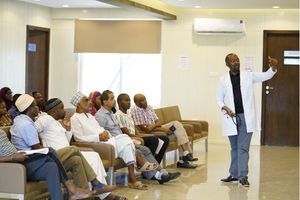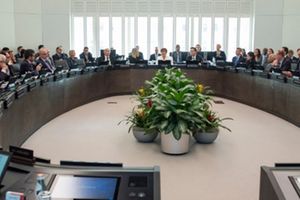Everything you need to know about Trading Forex in Tanzania

What you need to know:
- Forex market is the largest financial market in the world. As of 2019 according to report by BIS, it had generated over $6.6 trillion as daily currency trade volume. Another sub-segment for this market was retail forex trading, which is also growing globally.
Forex market is the largest financial market in the world. As of 2019 according to report by BIS, it had generated over $6.6 trillion as daily currency trade volume. Another sub-segment for this market was retail forex trading, which is also growing globally.
Seeing the growth in this industry, leading CFD brokers have set up shop in different countries around the world, while placing specific significance on the African continent.
Trading of cryptocurrencies, commodities, stocks & forex has been growing in Africa in the recent years. Owing to the growth of mobile penetration & cheap internet data, most of the online trading in Africa is done on mobile devices, as opposed to other devices.
Over the last few years, Africa has seen massive growth in the retail trading industry & new market regulations have been established in various countries. The Forex market in Africa has expanded massively & there are estimated to be around 1.3 million active traders on the continent.
Tanzania is amongst the African countries where retail forex trading trend is growing. But there are risks & challenges for the traders involved.
How does Forex Trading work?
Retail Forex or currency trading is done by trading various currency pairs like EUR/USD, GBP/JPY etc. Traders can buy, sell or exchange currencies based on the current exchange rate of a currency pair. The exchange rate of a currency traded in the forex market is determined by many factors mainly the political scenario of a country.
Depending on how well a country and its currency are doing, traders around the world trade currency try to predict if a currency is going to fall in price or increase in price.
For example, the value of many emerging market currencies saw a massive drop against US Dollar during the COVID-19 crisis in 2020. Some currencies like Brazilian Real, Turkish Lira dropped as high as 20% in few months.
So, a trader involved in the markets could have bought USDTRY via a forex broker to go short or sell TRY. Your natural move would have been to buy the US dollar to make profit from the rise in US dollar value against emerging market currencies.
How can you Trade forex?
You can trade Forex by registering yourself & opening a Trading account with a licensed broker. The regulatory authorities in Tanzania have not allowed any forex brokers to allow online retail forex trading services in the country currently & there are no regulated brokers in Tanzania currently.
It’s very important that you open account with a forex broker that has been duly licensed by top-tier regulatory authorities like FSCA, FCA etc. since it offers you more protection, which is otherwise missing when you are trading with an unregulated broker.
There are a lot of fake brokers & advisers who promise to offer great returns to general public, but in the end the real intention is to scam them. So, if you are going to start trading then the first step should be to find a reputed broker and check if it is licensed with Mutiple top tier regulators.
After registering yourself, you can use the demo account to place demo trades & learn how the market functions and how the price of a currency drops and increases. While trading on a demo account you can understand the market pattern and learn all the facilities offered by the broker. Demo account gives a good learning experience for new traders since it helps users understand market fluctuation and how to tackle that fluctuation.
Forex trading involves a lot of risks, ensure that your broker offers features to reduce the risk of losing money by having features like stop loss, risk reward calculator etc. This allows users to restrict losses in case of wrong trade.
Risks of Online Forex Trading
Though Forex market might seem like an extremely good idea to double your money from the various ads that you might have seen, but it’s not as easy as it looks. Infact it is estimated that 70-80% of retail traders lose money, according to stats by various regulators.
There are too many factors that affect how the market functions which is called the market risk, and it’s not possible to keep track of all factors that can influence the market prices.
Even the most experienced traders cannot make successful trades all the time. This is why you need to stay constantly updated with whatever is happening around the world.
For example, last year in March, owing to COVID almost all currency pairs became volatile and some even dropped up to 35% in value.
The worst hit countries because of this pandemic where the developing nation currencies. The South African Rand took the biggest hit in Africa and fell by 32% against the US dollar, although it has recovered most of the losses since. Nigerian Naira has also fell significantly during the last 1 year.
Apart from market fluctuations there are other things that you need to consider like leverage level. Leverage can make or break your trade. Many unexperienced traders don’t understand the concept & risks of leverage which is why most of the retail investors lose their money in the Forex market. When using leverage, an investor can lose more than the invested amount.
For example, if you invest $100 at a leverage that is 1:100, then the total amount available for trading will equal to $10,000. This means that you can lose up to $10,000 even if you invest only $100.
Beginner investors need to be vary of all the intricacies before getting into Forex & CFD trading. A good way to start is to try trading through a demo account and see how well you can trade, and manage risks under different market conditions. Based on the performance in your demo account over a period of few months, you should make a data backed decision on whether you should trade with real money or not.
Is Forex Trading legal in Tanzania? What are the Forex Regulations in Tanzania?
The main regulatory body of Tanzania is the Central Bank of the country, the Bank of Tanzania (BoT). The Central Bank is responsible for drafting policies and regulating practice for the financial sector.
Currently forex trading in Tanzania is not regulated and there are no locally licensed brokers. Which means retail investors investing in forex do so at their own risk with no dispute resolution in case of malpractice by brokers.
As per BoT, people sending or investing money abroad must do so only using Authorized Dealers (AD) institutions like banks where customers hold their accounts. Banks need to report these transactions to BoT. There are restrictions on transactions in foreign currency.
Owing to lack of regulations, Forex Trading is quite unsafe considering the uncertainties and risks surrounding it. Unregulated brokers will not have any regulatory authority governing their services, this opens up the users to a large number of scams as they will not have any protection for a local authority in Tanzania. Retail investors will be at risk of losing their money and will have no way of recovering them.
For the time being it is advised for investors in Tanzania to not engage in Forex trading as it is not regulated in the country.
Even now there are many retail investors in Tanzania who are already trading in the global financial markets. Most retail traders from Tanzania who are already trading forex & other financial instruments are doing so via foreign regulated brokers from South Africa, UK, Australia etc.
If you do decide to trade forex & other instruments like stocks in global markets, then its best if you trade with internationally recognised and well licensed brokers, which would offer more safety and security than a broker that has an offshore license.
In Africa, forex trading is regulated in South Africa& Kenya and the financial regulators in these countries follow global standards, SA’s market regulator is the oldest and the most developed on the continent. Similarly the forex trading industry is regulated in most EU countries, UK & in Australia. The brokers from these countries own licenses from FSCA in South Africa, FCA of the UK, or Cyprus’s CySEC, ASIC in Australia etc. There are a numerous of authorized Forex brokers from these countries that are offering their services to the citizens of Tanzania.
Some of the most popular forex brokers in Tanzania are Tickmill, Exness, Hotforex & FXPesa; these brokers are licensed in neighbouring countries such as South Africa, Kenya etc. where the retail forex trading market is regulated.
Also, before choosing an international broker, read about the company, see if they have all necessary licenses, talk to other investors who have used foreign brokers before and then start by trading on a demo account to get a hang of the broker’s app.
Stay away from any broker or so-called advisor offering to invest money for you & promising returns. Returns in any financial markets are never guaranteed, and only licensed participants are allowed to offer trading services.
Only invest real money into what you understand.
So, what’s the best way to go forward?
One of the main reasons why Tanzanian regulators have not regulated this sector could be because this is not a still not a large enough industry. But since retail trading is catching up in Africa & growing fast in Tanzania & other neighbouring countries.
Many African countries have been quick to understand the risks for retail investors of trading in an unregulated environment, as many investors might decide to trade with foreign unregulated brokers which puts them at risk.
Considering the risks for investors & increased number of participants, many countries have regulated the local retail trading industry as is the case with CMA in Kenya, FSCA in South Africa, we might also see regulation in Tanzania in future.
But for now, it is advised to not engage in trading with unregulated brokers, as these are not safe & there would be no redressal in case of dispute with the broker. You could end up losing your invested capital when you trade with fake brokers.




